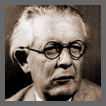“Cognitive theorists recognize that much learning involves associations established through contiguity and repetition. They also acknowledge the importance of reinforcement, although they stress its role in providing feedback about the correctness of responses over its role as a motivator. However, even while accepting such behavioristic concepts, cognitive theorists view learning as involving the acquisition or reorganization of the cognitive structures through which humans process and store information. (Good and Brophy, 1990, pp. 187)” (Mergel, 1998)
 Summary: Summary:
Based on the thought process behind the behavior. Changes in behavior are observed, but only as an indicator to what is going on in the learner's head.
Cognitive theorists are concerned with the changes in a student's understanding that result from learning. They believe that learning must be meaningful. Cognitive learning is based on schemata or mental structures by which students organise their perceived environment. Schematic structures of cognitive development change by the process of assimilation and accomodation. Whelan (2005) found that cognitivism emphasizes the importance of perception, learning, and thought as bases for understanding human behavior and learning. Rooted in information processing theory pioneered in the 1960s, cognitivism draws from the analogy between computers and minds, allowing for the possibility of computer programs that "think" alongside their human users. Cognitivistic instructional design is characterized by analytic breakdown of a topic or subject matter, and the transformation of the subject matter into a set of structured cognitive tasks. Cognitivistic frameworks can include discovery tasks, problem diagnosis, and troubleshooting; Papert's LOGO-based learning tools are considered cognitivistic. In these frameworks, knowledge acquisition is seen as an active, learner-driven outcome, much more so than with behaviorism.
 Cognitivism Philosophy: Cognitivism Philosophy:
- Based on thought process behind the behavior changes in behavior are observed, and used as indicators as to what is happening inside learners mind.
- Behavioral changes are compiled, break into parts and then measured, explained and established. Conduct a cognitive task analysis to determine the best sequence of mental operations, and then prescribe a sequence of learning activities that will enable the learners to reach the goals.
- The learner processes symbols and grasps the meaning of the symbols. He is able to distinguish between the knowledge of concepts and the knowledge of the procedural steps involved with those concepts. His knowledge is organized in his schema.
- Learner attend to and process incoming information, relating it to what is already in memory.
- Instructor organize information, direct attention, enhance encoding and retrieval, provide practice opportunities, and help learners monitor their learning.
- Learning outcome: Declarative knowledge, procedural knowledge, memory.
(Driscoll, 2005)
 Key words: meaningful learning, meaningful verbal learning, information-processing models, short-term-memory, long-term-memory, cognitive structure, cognitive maps, mental maps, assimilation, rehearsal, elaboration, organisation, comprehension monitoring, affective domain, insightful learning, isomorphism, phenomenology, productive thinking, accomodation, epistomology, intelligence, schema, latent learning. Key words: meaningful learning, meaningful verbal learning, information-processing models, short-term-memory, long-term-memory, cognitive structure, cognitive maps, mental maps, assimilation, rehearsal, elaboration, organisation, comprehension monitoring, affective domain, insightful learning, isomorphism, phenomenology, productive thinking, accomodation, epistomology, intelligence, schema, latent learning.

 Cognitivist Theories: Cognitivist Theories:
- Information Processing 1
- Assimilation theory of learning - David Ausubel
1
- Schema theory of learning
- Anderson 1
- Theory of Cognition and Emotion
- Higgins
- Theories of Perception - Gestalt
- Cognitive Development in stages - J. Piaget 1
- theory of learned helplessness - Seligman
- Proximal Development - Vygotsky
- Cognitive Development - Piaget

- ACT-R theory - Anderson

- Schema Theory
 1 1
 Cognitivist theorists: Cognitivist theorists:
- J. Piaget

- E. Tolman
- A. Bandura
- R. Gagne 1
- D. Norman
- D. Ausubul
- K. Koffka
- W. Kohler
- M. Wertheimer
- L. Vygotsky

- R. C. Anderson
 Jean Piaget Jean Piaget

Jean Piaget studied children’s development from the 1920s until the 1960s. He believed that cognition developed in stages from childhood to adulthood. Piaget also believed the humans were active processors of information, and that knowledge is organized into schemas. (Schemas are structures that change with development).
[Back to Top]
 Lev Vygotsky Lev Vygotsky

Lev Vygotsky studied children in the 1920s and 1930s in Russia. His works were only translated in the 1960s through the 1990s. He believed that learning begins as social activities and that as children develop, they internalize these processes and can then use them independently. He theorized that children have a zone of proximal development (ZPD)- the zone in which they can do something with help from others, but cannot yet perform the task on their own. This guidance from others that allows learners to complete tasks within their ZPD he termed scaffolding.
 Lev Vygotsky Archive Lev Vygotsky Archive 
[Back to Top]
 R. C. Anderson R. C. Anderson

R. C. Anderson developed the schema theory of learning, which suggested that people store information in organized structures of interrelated ideas and meanings, called schema. Although the term schema was termed by Piaget, schema theory was developed by Anderson.
 Schema theory of learning Schema theory of learning 
[Back to Top]
 References: References:
Anderson, J., (2003). ACT-R: John R. Anderson Research Interests. Retrieved July 20, 2006, from http://act-r.psy.cmu.edu/ 
Clark, D. (1999). Fred Keller and PSI. Retrieved online July 3, 2006 from http://www.nwlink.com/~donclark/hrd/history/psi.html.
Chowdhury, M. (2006) New technologies in new media classroom. IEEE Xplore. IEEE Catalog Number: 06EX1387C, ISBN: 1-4244-0406-1, Library of Congress: 2006925538
Driscoll, M. P. (2005). Psychology of learning for instruction. Boston, MA: Allyn and Bacon.
Doolittle, P. E. Integrating Constructivism & Cognitivism. Retrieved August 15, 2006 from http://edpsychserver.ed.vt.edu/research/icc.html.
Driscoll, M. P. (2005). Psychology of learning for instruction. Boston, MA: Allyn and Bacon.
Gardner, H. (2000). Can technology exploit our many ways of knowing? Can Technology Exploit Our Many Ways of Knowing
Ho, W. (n.d.). Cognitive theories of learning. Retrieved August 17, 2006 from http://www.personal.psu.edu/users/w/x/wxh139/cognitive_1.htm#schemta 
Jonassen, D. (2000). Computers as mindtools for schools: engaging critical thinking. Upper Saddle River, NJ: Merrill.
Mergel, B. (1998). Instructional design and learning theory. Retrieved July 12, 2006, from http://www.usask.ca/education/coursework/802papers/mergel/brenda.htm 
Molenda, M., Reigeluth, C. M., & Nelson, L. M. (2003). Instructional Design. In L. Nadel. (Ed.), Encyclopedia of Cognitive Science (Vol. 2, 574 – 578). [Electronic version].
Naik, P (1998). Behaviorism as a Theory of Personality: A Critical Look. Retrieved online July 10, 2006 from http://www.personalityresearch.org/papers/naik.html
Precision Teaching (n.d.). Retrieved online July 3, 2006 from http://psych.athabascau.ca/html/387/OpenModules/Lindsley/introa1.shtml
Simpson J. (2000) It's All in the Upbringing. Retrieved August 16, 2006, from http://www.jhu.edu/~jhumag/0400web/35.html
Skinner B. F. (1947) Superstition' in the Pigeon. Journal of Experimental Psychology. 38,
pp. 168-172.
Retrieved August 16, 2006, from http://psychclassics.yorku.ca/Skinner/Pigeon/
Valdez, G., McNabb, M., Foertsch, M., Anderson, M., Hawkes, M., Raack, L., (2001).Computer-Based Technology and Learning: Evolving Uses and Expectations. North Central Regional Educational Laboratory. Retrieved August 9, 2006 from http://www.tc.umn.edu/~mcleod/criticalissues/pdf/valdez.pdf.
Veenema, S. & Gardner, H. (1996). Multimedia and multiple intelligence. The American Prospect, November-December, 1996, 29, p 69-75
Watson, J. (1913). Psychology as the behaviorist views it. Psychological Review, 20, pp. 158-177. . Retrieved August 12, 2006, from http://psychclassics.yorku.ca/Watson/views.htm
Watson, J. B. & Rayner, R. (1920) Conditioned emotional reactions. Journal of Experimental Psychology, 3(1), pp. 1-14. Retrieved August 12, 2006, from http://psychclassics.yorku.ca/Watson/emotion.htm
Whelan R. (2005). Instructional technology & theory: a look at past, present & future trends. Retrieved August 18, 2006, from http://www.nyu.edu/its/pubs/connect/spring05/whelan_it_history.html 
[Back to Top]
 Links: Links:
[Back to Top] |

